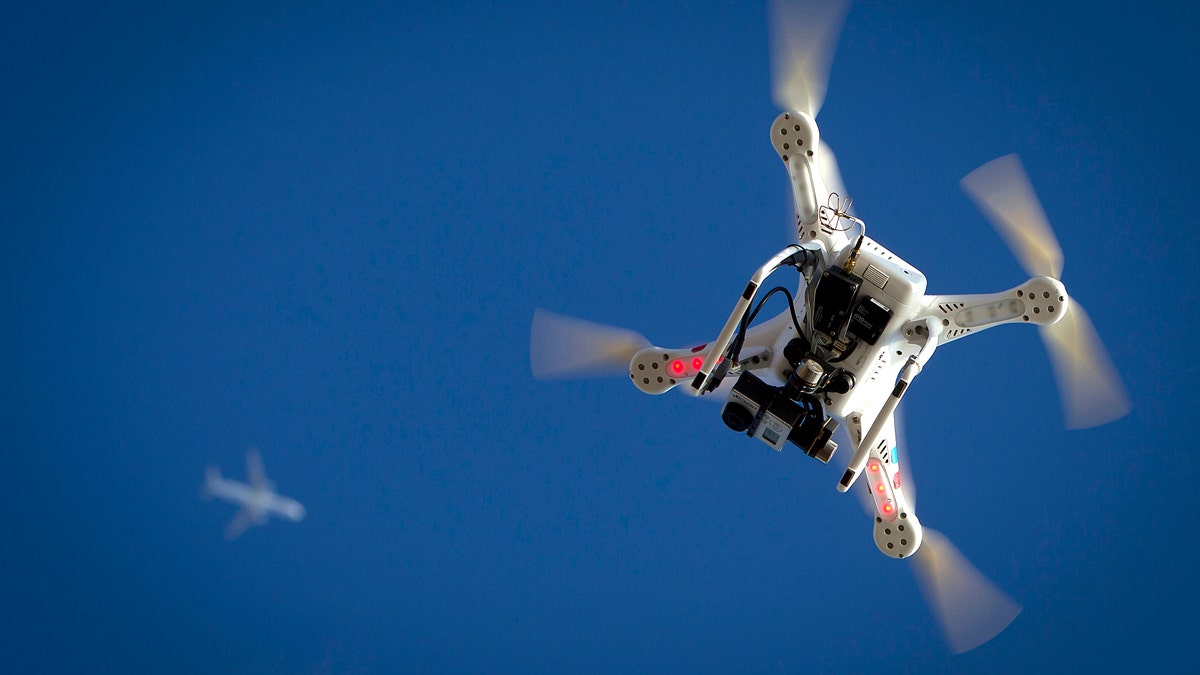
File photo - An airplane flies over a drone during the Polar Bear Plunge on Coney Island in the Brooklyn borough of New York Jan. 1, 2015. (REUTERS/Carlo Allegri)
Drones could someday have a sort of invisible license plate that allows local authorities to determine who the unmanned aerial system (UAS) belongs too. Pitched by Chinese drone manufacturer DJI, the concept for an electronic identification system for small drones is just one of many ideas as the Federal Aviation Administration looks into potential ways of identifying drone users.
DJI suggests drones should use the radio equipment already on board most systems to transmit a unique registration number. That number would identify the drone owner to law enforcement in the event of a complaint or flight through a restricted area. Areas with restricted drone flight, such as airports, could use radio equipment to read that number and report the ID number to the authorities. Since identifying the drone would require access to a database linking each number with a name, the invisible license plate approach would be less likely to be abused outside of law enforcement, DJI suggests.
More: DJI study says drones are already saving over one life a week
"The best solution is usually the simplest," DJI wrote on Monday. "The focus of the primary method for remote identification should be on a way for anyone concerned about a drone flight in close proximity to report an identifier number to the authorities, who would then have the tools to investigate the complaint without infringing on operator privacy."
More From Digital Trends
- DJI study suggests little risk from raising drone weight limit 4-times higher
- What you need to safely (and legally) fly your own drone
- The best cheap drone you can buy
- Drone sightings are up, but the FAA hasn't confirmed any plane collisions yet
- This drone-photo firm just paid a massive fine over alleged illegal flights
The paper was submitted to the Association for Unmanned Vehicle Systems International, a group collecting perspectives on possible identification systems. In 2016, Congress asked the FAA to come up with a system for identifying drone operators, with the deadline still two years out.
DJI says their approach is simple, yet still maintains the privacy of the drone operator. The company says drones are often used in cases with legitimate needs for confidentiality, such as an energy company surveying potential locations for new wind farms. With legal drones often coming under gunfire and their pilots often on the receiving end of threats, DJI feels the identification system should not disclose the owner's identity to the general public.
The drone manufacturer proposes the invisible license plate instead of a transmission system that attempts to track all the airborne drones in real time. Besides just being a very complex way to monitor drones, the idea would also expose details about the drone to more than just the local authorities.
"No other technology is subject to mandatory industry-wide tracking and recording of its use, and we strongly urge against making UAS the first such technology," the white paper reads. "The case for such an Orwellian model has not been made. A networked system provides more information than needed, to people who don't require it, and exposes confidential business information in the process."
The radio frequency "license plate" instead allows authorities to read the ID number (even in scenarios when a printed number would be too difficult to read on a small, quick drone), without disclosing information about legally flying drones to the general public.
